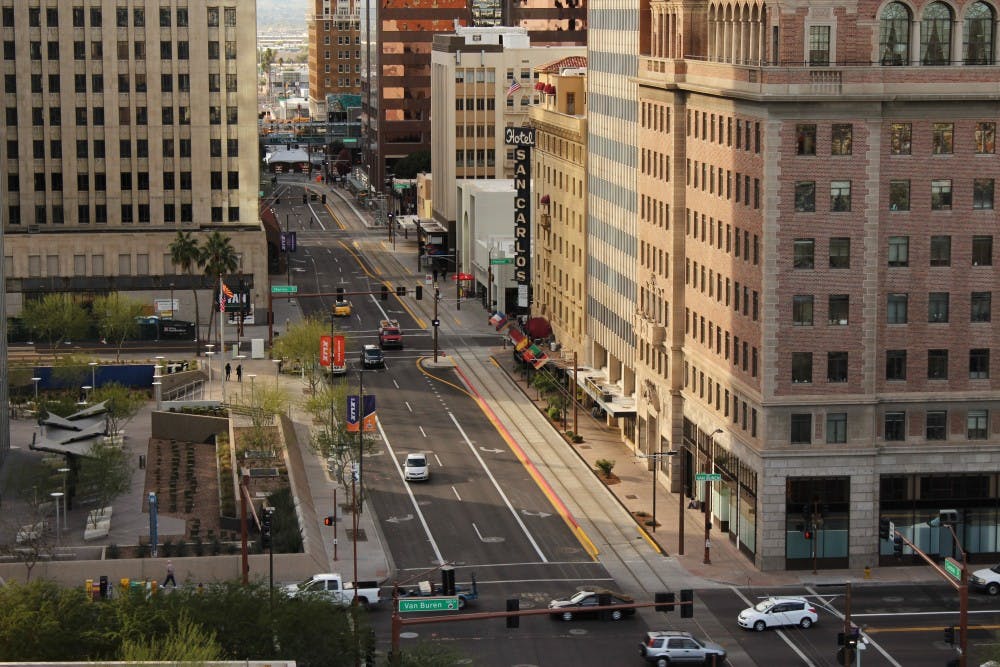It seems that Arizona, one of the states hit particularly hard by the recession of 2007, is on an economic upswing, according to data from the U.S. Bureau of Labor Statistics.
As of October, Phoenix has regained 99.6 percent of the jobs it lost during the recession, whereas the state as a whole has recovered 90 percent of the jobs it lost at its lowest point.
It has taken the city longer to reach full recovery than it has for other similarly sized cities, but it appears things are looking up, Greater Phoenix Economic Council spokeswoman Michelle Kauk wrote in an email.
"A lot of the jobs that were lost during the recession were in consumption based industries, such as retail, construction and services," she wrote. "We have now recovered more than 95% of the jobs lost in the region, and seeing growth in industries such as healthcare, software and financial services."
Job recovery in the Valley is not only attributable to lost jobs coming back, but also to the attraction of some big-name companies to the Valley.
"As a regional economic development organization, GPEC works with our cities and towns to lead the attraction of companies to the greater Phoenix region," he wrote. "In the past three years we have assisted in location more than 100 companies to the region with higher than average wages."
City of Phoenix Community and Economic Development director Christine Mackay was working in housing in the city when the crash first hit in 2007. She wrote in an email that applications for new home permits dropped from hundreds a month to zero overnight, accompanied by a huge loss of jobs in the region.
"Phoenix was hit by the recession as hard as any city across the country," Mackay wrote. "You look at Las Vegas, Orlando, the cities that were just decimated — they were high growth cities that had been doing high net migration for decades. ... So you had this robust home building industry, and that stopped almost in one day."
When the economy crashed, housing construction rapidly decreased, followed by a loss of construction jobs and then a loss of jobs and economic activity in general. This is a sector in which the city has been struggling to recover.
"The reason it's taking us so long to come back is, of those 100,000 construction jobs that were lost, only 20,000 have come back," she wrote.
However, Mackay wrote that the city's well-planned nature, the ease of doing business in Phoenix and the attractiveness of its university system have all helped its recovery. She also attributed both the city's economic and cultural growth to the expansion of light rail, the presence of ASU and UA downtown and the movement of Phoenix's working community from the suburbs back to the center of the city.
She wrote in an email the keys to getting Phoenix fully recovered will be improving infrastructure and working with the state's universities to keep an educated workforce in the Valley. She also said the best way to prevent such drastic job loss in the future is to prioritize a self sufficient economy over a growing one.
And, the Valley's university system certainly has an impact on employment in Phoenix. Elaine Stover is the Director of Career Services in the Career Services department on the Tempe campus. She wrote that many ASU grads go on to contribute to the economic welfare of Arizona and the Valley.
"About 87 percent of ASU grads who are seeking employment find it," Stover said. "Of the jobs that they find, I think about 70 percent are in Arizona."
Related Link:
Light rail expansion to benefit students, residents in Phoenix
Reach the reporter at Arren.Kimbel-Sannit@asu.edu or follow @akimbelsannit on Twitter.
Like The State Press on Facebook and follow @statepress on Twitter.




